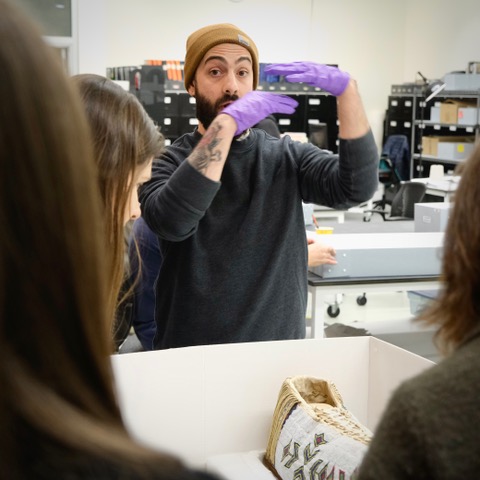A Lesson in Trust
“In our business,” Dr. Patrello told us, “we like to say that ‘things move at the speed of trust’.” It was a nice turn of phrase and I could see heads nod among our leadership team.
Chris Patrello, Assistant Curator of Anthropology at the Denver Museum of Nature and Science, was our guide for Prosono’s first off-site meeting for 2023. I like to organize company off-sites in unfamiliar places to stimulate thinking and to incubate new ideas, and I find that it helps to have thoughtful people like Dr. Patrello lead the conversation.




As we followed Chris through the bowels of the museum’s artifact storage center, he explained the complicated process by which cultural artifacts are acquired, and sometimes “deaccessioned” by the museum. “Fundamentally, I think the role of a curator and anthropologist is to talk to people from a variety of backgrounds and connect with them in meaningful ways,” he told an interviewer. And the foundation of that connection, he told us, is trust.
In the 19th and then well into the 20th Century, museums around the world gave little thought to who rightfully owned the sculptures, masks, vases and rock carvings they acquired through purchase – or even outright theft. Not anymore. Today, museums spend almost as much time certifying and legitimizing their acquisitions and their holdings as they do in curation. And negotiations over ownership and provenance can get contentious, as Dr. Patrello can attest.
Who actually owns that beautiful Native American headdress? How was it acquired? Should it be returned to the people who made it? As Dr. Patrello explained, nowadays it’s critically important for museum curators to be able to demonstrate their sincerity and their good intentions – their trustworthiness – to skeptical representatives of indigenous groups.
“To be honest, I don’t think it’s that hard to do the right thing,” Dr. Patrello said, as he reflected on his role in these negotiations. “Sometimes, I think we just make doing the right thing more complicated than it needs to be.”
Can businesses, like a museum, operate “at the speed of trust”? How important, really, is trust in the business world, or how important should it be? And just how hard is it to “do the right thing” if you’re running a competitive business, or a high-profile foundation or institution? Are we, in fact, making “doing the right thing” too complicated?


Thinking about these two notions – trust, and doing the right thing – reminded me of the “Tylenol Murders” story often taught as a case study to students in business schools. Back in 1982, someone secretly laced Tylenol capsules with cyanide and put the jars back on pharmacy shelves. Seven people died from ingesting the capsules, and Johnson & Johnson, the makers of Tylenol, was faced with a textbook corporate crisis. The victims were all from the Chicago area, so the problem seemed localized. But trust in one of their most profitable products had been damaged, perhaps irreparably.
Supposedly – and this part of the story might be apocryphal – J&J convened an emergency board meeting to decide how to handle the crisis. Lawyers and accountants were present and almost certainly weighed in on the company’s legal exposure and bottom line. Someone suggested that J&J take all of the bottles of Tylenol off of America’s store shelves and re-issue the product with tamper proof packaging. The accountants objected. It was just a “Chicago problem.” The cost would be enormous. But then someone pointed to a faded sign, high on the wall. “We believe our first responsibility is to the patients, doctors and nurses, to mothers and fathers and all others who use our products and services.” The J&J credo. They knew what they had to do.
The aftermath of the (possibly apocryphal) board meeting is well known. Johnson & Johnson issued an immediate mass recall of all 31 million bottles of Tylenol and developed an industry-leading triple tamper-evident seal for their product. The recall cost them a fortune, but their determination to “do the right thing” solidified their reputation as a trustworthy wellness provider among the millions of “mothers and fathers and all others” who used their products. And they are still, profitably, selling Tylenol today.
I think the reason business schools like to teach the Tylenol story is because they want future business leaders to understand that “doing the right thing” isn’t just a moral issue. It’s good business. It builds trust. And when businesses move “at the speed of trust” they serve both their customers, and their bottom lines.
Dr. Patrello gave us a lot to think about. Our thanks go out to him and to the Denver Museum of Nature and Science for a memorable – and inspiring – Prosono off-site event.
